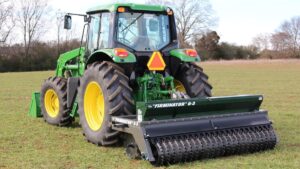Discover the Best Feed for Baby Goats: A Complete Feeding Guide

Are you ready to give your baby goats the best start in life? Providing the right feed is crucial to their growth, health, and happiness. If you’re searching for the best feed for baby goats, this guide will help you navigate their dietary needs and ensure they thrive.
Why the Right Feed Matters
Think of baby goats as tiny engines—they need the right fuel to run smoothly. Proper nutrition is essential for their development, including strong bones, a robust immune system, and plenty of energy. A well-balanced diet sets the stage for healthy growth and a happy life.
Colostrum: The Foundation of Good Health
Colostrum is the very first milk that a mother goat produces after giving birth. This nutrient-rich milk is packed with antibodies that help newborns fight off diseases and build a strong immune system. It’s crucial that baby goats receive colostrum within the first few hours of birth for the best protection and growth.
If the mother goat cannot provide enough colostrum, or if you’re raising an orphan, use a high-quality colostrum replacer. Administer it promptly to give your baby goats the vital nutrients they need to start life strong.
Fresh Goat Milk or Milk Replacer: What’s Best?
Once the initial colostrum phase is over, your baby goats need a steady supply of milk. Fresh goat milk is ideal as it provides the perfect balance of proteins, fats, and vitamins. If you’re not able to provide fresh milk, a specially formulated goat milk replacer is a great alternative.
Goat milk replacers are designed to replicate the nutritional profile of fresh goat milk, ensuring your kids get the right nutrients. Avoid using cow’s milk or cow milk replacers, as they don’t meet the specific needs of baby goats and can lead to digestive issues.
When to Introduce Solid Foods
Around two to three weeks of age, your baby goats will start to show interest in solid food. This is the perfect time to introduce creep feed, a specially formulated feed designed to support the rapid growth of young goats.
Start with a small amount of creep feed in a shallow dish. Creep feed should be high in protein and energy to help with their growth. Gradually increase the quantity as your kids begin to eat more. This helps prepare their digestive system for a diet that will eventually consist of mostly solid foods.
The Role of Hay in Their Diet
Hay is a vital part of a baby goat’s diet. It provides necessary fiber for healthy digestion and helps develop the rumen, which is essential for processing solid food. Alfalfa hay is a great choice because it’s high in calcium and protein, which are important for bone development and overall health.
Ensure the hay is green, leafy, and free from mold. Avoid hay that is dusty or full of stems, as it can be difficult for young goats to chew and digest.
Mineral Supplements: Why They’re Important
Minerals are crucial for the overall health of your baby goats. They support bone growth, muscle function, and overall well-being. Providing a free-choice mineral supplement designed for goats ensures that they get essential nutrients like calcium, phosphorus, and copper.
Make sure the mineral supplement is fresh and available at all times. Consult with your veterinarian to select the best supplement for your specific herd needs.
The Weaning Process: Transitioning Smoothly
Weaning is an important phase where baby goats transition from milk to solid foods. This usually starts around 8 to 12 weeks of age. The key is to make this transition gradual to avoid stressing the kids.
Slowly reduce the amount of milk they receive while increasing their intake of creep feed and hay. Monitor their weight and health throughout the process to ensure they’re adjusting well. By the end of weaning, they should be eating a balanced diet of hay, feed, and minerals.
Avoiding Common Feeding Mistakes
Feeding baby goats may seem straightforward, but there are common pitfalls to avoid:
- Overfeeding Milk: Too much milk can lead to digestive problems. Follow recommended feeding guidelines to avoid issues.
- Introducing Solid Food Too Early: Baby goats have sensitive digestive systems. Introduce grains and other solid foods gradually.
- Neglecting Water: Even though they drink milk, baby goats need constant access to fresh, clean water.
- Skipping Hay: Hay is essential for digestion and should be introduced early in their diet.
Final Thoughts: Ensuring Your Baby Goats Thrive
Feeding your baby goats the best diet is essential for their health and development. From the crucial colostrum to the gradual introduction of solid foods, every step plays a role in their growth. By providing the best feed for baby goats, you’re setting the foundation for a healthy, thriving herd.
By understanding their nutritional needs and avoiding common mistakes, you’ll help your baby goats grow into strong, happy adults. With the right care and attention, your goats will bring joy and success to your farm.





